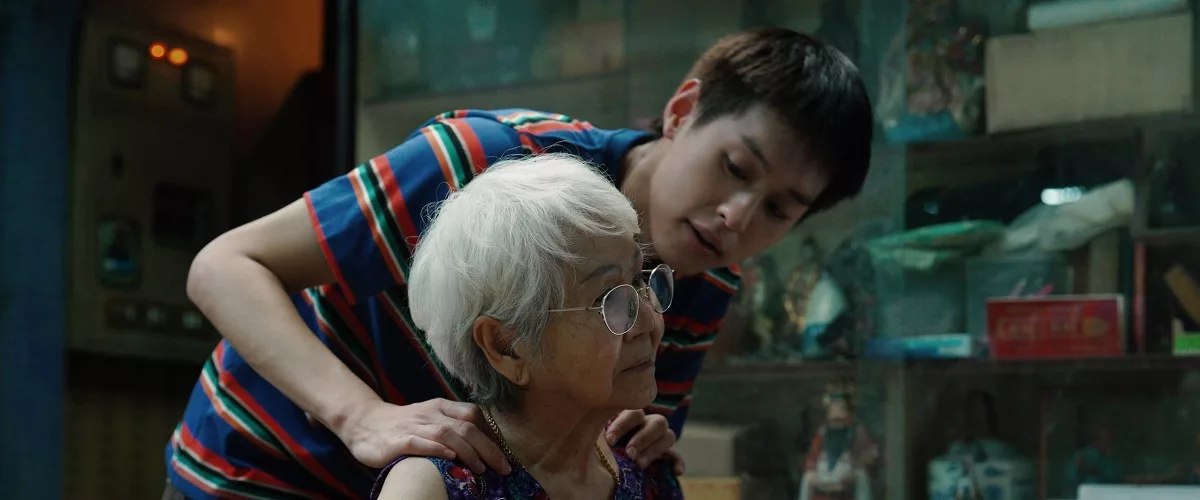The Thai family drama “How to Make Millions Before Grandma Dies” looks and sounds more composed than you might expect from a tearjerker about a family of greedy, discontented schemers. It’s never hard to guess what motivates these characters since it’s usually a variation on the same compulsion—to curry favor with Grandma Menju (Usha “Taew” Seamkhum) so that they inherit her coveted house. We mostly follow M. (Putthipong “Billkin” Assaratanakul), a lazy college dropout who commits himself to caring for his grandma after he fails to make a name for himself as a video game streamer.
M.’s transparent behavior would make for a stifling window into the movie’s world if writer/director Pat Boonnitipat and his collaborators weren’t so good at packing every scene with lived-in details. Likewise, “How to Make Millions Before Grandma Dies” may be about characters who seem obvious, but their actions and behavior grow more complicated with each new scene. It’s the highest-grossing movie of the year in Thailand and a blockbuster throughout Southeast Asia, and it’s almost as good as its crowd-pleasing reputation.
Set mostly in Bangkok’s Chinatown neighborhood, “How to Make Millions Before Grandma Dies” follows Menju as she squares away her affairs following a cancer diagnosis. Everyone in the family knew about Menju’s illness before she did, so of course, M. tries to cram his foot in Nana’s door by telling her what no one else did. Unfortunately for M., Menju’s pretty set in her ways, making it much harder for her to trust, let alone see her family members for who they are. She does put in the work, though, one episodic interaction at a time. Meanwhile, M. cozies up to Menju and inadvertently fills the caregiver role that he only really dove into on a whim. Other family members, particularly M.’s mother Sew (Sarinrat “Jear’ Thomas) and his uncle Kiang (Sanya “Duu” Kunakurn), have committed more time and attention to Menju. But M.’s the one who insinuates himself into Menju’s life so forcefully that she winds up embracing her family.
As you might expect, a good portion of “How to Make Millions Before Grandma Dies” concerns M.’s personal growth. We join him as he starts to see the world as a bigger place, though its existence beyond his life and experiences is thankfully foregrounded throughout. You can hear it in the ambient sounds on the movie’s soundtrack, including slow-dripping rain and excited birdsong, and also see it in the streets, stairwells, and corridors that Menju crosses and M. trails after. When Menju and Sew go to the community pool for a little exercise, Boonnitipat takes time to highlight the other swimmers, just like he shows us the dozens of other hospital patients and their caretakers when Menju waits to start her chemotherapy treatment. There’s a whole world beyond M. and Menju’s unlikely bonding, and it’s often emphasized with as much care and sensitivity as Boonnitipat and co-writer Thodsapon Thiptinnakorn’s measured and very believable dialogue.
“How to Make Millions Before Grandma Dies” is still plenty sentimental, as you might expect from a movie that follows an older mother as she tries to accept her own mortality and keep her family as close as she can without being taken advantage of. There’s also a few unbearably precious jokes about aging and bodily functions, like when M. gives Menju a sponge bath or when Menju’s deadbeat adult son Soei (Pongsatorn “Phuak” Jongwilas) offers to install a guard rail in her bathroom right after he takes a “big dump” in her toilet, leaving the floor extra “slippery.”
Boonnitipat and his collaborators still deliver a superior weepie simply by observing the bigger-than-life and typically ostentatious feelings that surface during a loved one’s end-of-life care. If you’ve ever had to care for an aging loved one, you know that showing up is an act of devotion since it requires the sort of patience, discipline, and care that you can only develop by committing yourself to someone else’s needs. M.’s devotion to his grandmother may not be selfless, but he’s still there for M. as she comes to see her family in a new light despite their apparent shortcomings.
What “How to Make Millions Before Grandma Dies” lacks in subtlety, it more than compensates for in its range of feeling and the surprising depth of its feel-good reassurances. The filmmakers clearly appreciate the difficulty of accepting your loved ones despite their glaring imperfections. You don’t have to cry easily to appreciate what they’re going for; the movie’s sunny, gracious portrait of family life will still likely have you thinking of your own family long before the credits roll.




















